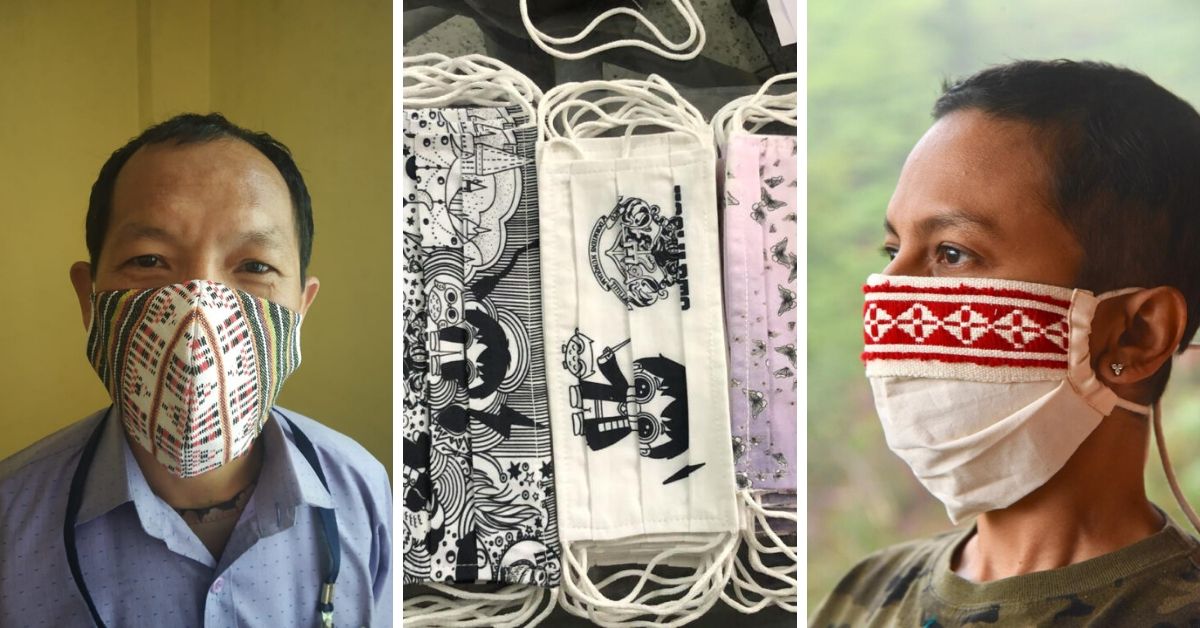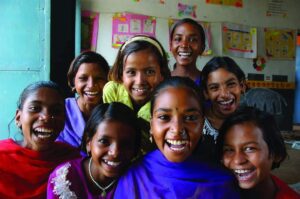Mask-up in Sustainable Style, While Supporting Amazing Artisans from Across India
Rural artisans from Assam are making masks using Eri silk, that’s known for its cooling properties in the summers and warmth in the winters. Check them out!

With lockdown restrictions easing in most parts of the world, and our country, wearing a mask has become mandatory. It is almost the next indispensable fashion accessory.
Facing the challenges posed by the pandemic and turning the crisis into an opportunity, individuals and Small and Medium Enterprises (SMEs) across India are stepping in to make reusable cloth masks. Inspired by the PM’s speech to make India self-sufficient, many are creating job opportunities for hundreds of artisans, tailors, weavers, within their communities. They’re also using the opportunity to support home-grown fabrics interlaced with traditional prints and embroidery.
Some are designing masks inspired by fictional characters to encourage children, while a few designs promote regional art. The artworks span almost every state of India — from Rajasthan’s Phad paintings to Kalamkari from Andhra Pradesh, West Bengal’s Kantha print to Tamil Nadu’s Toga embroidery. Some designers are fusing traditional, contemporary, and western designs.
Here’s a look at how individuals across India beat the lockdown odds and created employment opportunities for local communities by going ‘Vocal for Local’.
1. Indian Yards, Coonoor, Tamil Nadu

Coonoor-based Indian Yards is run by Suhas Ramegowda and Sunita Suhas. In 2017, they gave up their urban lifestyle in Bengaluru and moved to the Nilgiris for a better quality of life. They bought a piece of land, spent time farming, and worked in the fields alongside tribes.
“During this time, we realised that women in the community wanted to do much more with their lives. Mostly, they were homemakers with an interest in sewing, who didn’t have the platform to convert their skills into a livelihood opportunity. That is when we started Indian Yards, a platform through which they could express themselves,” says Suhas.
Through their livelihood programme AGAI, meaning ‘flourish’ in Tamil, they worked with 50 women from the rural and tribal communities, who became fine crafters of fabric.
When the lockdown was imposed, the husband-wife duo was caught unawares. With the ‘will do’ attitude of their team, they got going. They were approached by a Nilgiris-based NGO, Keystone, to make cotton face masks for the local police force and sanitation workers. Supplying these to the government meant they had permission to move around, making it easy for their supply chain, but also allowing them to train their women.
“We grabbed this opportunity and came up with sustainable and functional mask designs. We went from door-to-door, training our community every time we came up with a new design. We delivered different materials to their doorsteps, some of which were hand-woven and naturally-dyed cotton fabrics from Karnataka, and picked up finished masks from them.”
With regional and inter-border collaborations, Indian Yards incorporated the Toda embroidery art form — native to the Nilgiris. While the women of the Toda tribe did the embroidery — geometric shapes are woven using a red and a black thread over a white background, the duo designed and used the embroidery to make masks. A Nilgiris-based firm, Last Forest, sold over 700 of these Toda masks.
If there’s something the pandemic has taught Suhas and Sunita, it’s the simplistic outlook of their artisans. “There have been numerous instances when we visited our team, and their husbands stepped into the kitchen to make tea for us. Knowing that in India, male dominance is still the culture, it is heartening to see this change in their households.”
Environmentally conscious, Indian Yards has sold more than 40,000 masks since the lockdown. Their masks range from ₹15-95, while the Toda masks are priced at ₹225. Since the Toda women do only the embroidery, and different organisations make a wide range of products using the embroidery, the women get 75 per cent of the revenues generated through the sales of their embroidered designs.
Look them up on Instagram.
2. KAARII Designs, Jaipur, Rajasthan

Jaipur-based Rajat Rungta and Harshi Agrawal, co-founders of Kaarii Designs, an SME, have a different story.
“As Indians, we value foreign products more than homemade or indigenous ones. Even if the Indian products are sold by a foreign company, we are willing to pay the extra premium,” points Harshi.
This was when the duo decided to launch products and accessories for kids and adults in 2019, aiming to provide the highest quality standards, with an amalgamation of trendy designs, and a sense of sustainability.
“When the lockdown was eased, we saw this opportunity to sew masks to support our workers and generate employment. We’ve been experimenting with cotton and reusable masks,” points the 29-year-old artist.
Using their family-run textile unit, they were able to provide for their team of 50, who directly or indirectly helped stitch the masks. “Times are tough, but we are making sure we don’t lay off our workers but support them financially to cover their daily expenses,” adds Rajat.
Harshi, a doodle-artist, has used doodles in her masks to make them especially attractive for children. Kaarii’s mask motifs have zentangle flowers, animals, and characters, apart from regional prints. The highlight designs are those inspired by the fiction series, Harry Potter.
“The idea behind deviating from our regular production — home linen, quilts, bedsheets, baby tents, etc. was to generate revenues so that every member of our professional family had food at the end of the day.”
With their masks ranging from ₹13-80, KAARII has sold more than one lakh pieces since the lockdown.
Check out their website or look them up on Instagram.
3. Shimona Mehta, Bhadravathi, Karnataka

Fashion Artist Shimona Mehta was working in Bengaluru before the lockdown. She made it back to her small town in Bhadravathi just in time and decided to put her learnings from her student days at Pearl Academy in Jaipur to use. She also had experience at a renowned Fashion design house, Anna Sui, in New York.
“I started by conceptualising contemporary and western designs, and patterns on different fabrics to make timeless pieces. What started as a fun learning project eventually gained so much attention. That’s when I realised the dire shortage of masks, and how people were looking for comfortable, chic, and breathable masks,” says the 25-year-old designer.
With the perfect opportunity, Shimona boarded local tailors and sewists. She was confident that she could fuse western designs with traditional ideas to make masks using locally available materials.
“With masks being so much in demand, we experiment on new styles once a week. Since my masks use ruffles, which require precision, I also trained my team to stitch fine-tailored and finished masks.”
Celebrating the craftsmanship of the local artisans, Shimon points out, “This ‘vocal for local’ initiative is not only about providing tailors with a livelihood but also upscaling their existing skills. This also empowers them.”
Providing artisans with an opportunity and a platform to learn new skills has a psychological impact on them. “I’ve seen a sense of joy and happiness in them when they see the masks they stitched sell across India. Having always stitched traditional clothes like petticoats and blouses, it’s an awe-inspiring moment for them to express their creativity through masks and western wear.”
44-year-old Shobha Prasanna Kumar, who works with Shimona, is left surprised every time the team works together. She is unable to believe her eyes on the completion of a mask and asks herself, “Did I make this?”
Since the inception of her project, Shimona has sold more than 300 masks and range from ₹70-600. Ask her what’s in the pipeline, and the young designer expounds, “I hope to start a fashion clothing line experimenting with some extraordinary styles. This will allow me to stay connected with the artisans and keep them employed.”
Check out their website or look them up on Instagram.
4. Nishi Srivastava, The Craftsutra, Delhi

Nishi Srivastava, the founder of The Craftsutra, started the platform three years ago to promote Indian art and craft, although she has been involved in reviving dying art forms for almost a decade. In 2013, when she was backpacking in Kutch, Gujarat, she saw how the Lippan kaam, an art form indigenous to the region, was dying. Families weren’t keen on passing the skills to their children. Nishi decided to revive it and held more than 50 workshops.
Through her initiative ‘Masks of India’, Nishi encourages artisans from different Indian states to use regional art and crafts on hand-crafted masks. The idea was to promote Indian art and provide a sustainable livelihood for artists, artisans, and designers. “Masks are not only about making a style statement but also about keeping the needs of our community of artisans.”
She continues, “During this pandemic, masks have become a necessity. Unlike the surgical disposable masks that can harm the environment, masks under the initiative are eco-friendly, light, reusable, and biodegradable,” says the 30-year-old.
With a network of artisans making masks, Nishi gives an account of the art clusters she works with. “Artisans from Bhopal and Madhya Pradesh are using the Gond art form, while Lucknow’s Chikankari embroidery is mostly reserved for Indian wear; we have encouraged our weavers to up their creative styles and use them in masks instead.”
Nishi’s network also includes award-winning artist Kalyan Joshi from Bhilwara in Rajasthan. His famous Phad paintings are inspiring wedding masks.
“Artisans from the Khatri community in Gujarat’s Kutch are using the ajrakh block prints and ikat prints. Telangana’s Cheriyal paintings, most commonly seen on scrolls, are also being hand-painted on masks. Rural artisans from Assam are making masks using Eri silk, that’s known for its cooling properties in the summers and warmth in the winters.”
So far, West Bengal’s Kantha embroidery and Andhra Pradesh’s Kalamkari prints have been an instant hit on the platform. Since it’s barely been two weeks that Nishi started the initiative, she concludes, “The artisans are hopeful about their work as these masks not only represent the culture of unity in diversity but are also in line with the PM’s message of the ‘Make in India’ initiative.”
Masks on the platform range from ₹90-1,000. Check out their website or look them up on Instagram.
The pandemic might have made wearing masks mandatory but they also threaten the environment, leading to ocean pollution. We can be responsible and make smart choices by using eco-friendly, reusable masks that serve many purposes. Not only will they help in protecting ourselves and safeguarding others, but also in empowering artisans.
(Written by Ridhi Agrawal and Edited by Shruti Singhal)
Like this story? Or have something to share?
Write to us: [email protected]
Connect with us on Facebook and Twitter.
This story made me
- 97
- 121
- 89
- 167
Tell Us More
We bring stories straight from the heart of India, to inspire millions and create a wave of impact. Our positive movement is growing bigger everyday, and we would love for you to join it.
Please contribute whatever you can, every little penny helps our team in bringing you more stories that support dreams and spread hope.



















